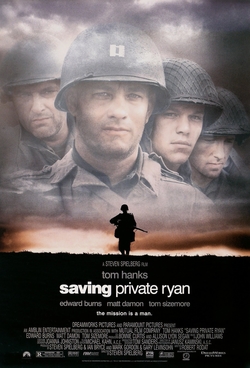
Introduction
‘Saving Private Ryan,’ directed by Steven Spielberg, is widely regarded as one of the most significant war films in cinematic history. Released in 1998, it is lauded not only for its gritty realism and intense battle sequences but also for its profound emotional depth, capturing the harrowing experiences of soldiers during World War II. The film’s relevance extends beyond its cinematic achievements, as it has shaped public perceptions of war and contributed to discussions on sacrifice, heroism, and the human cost of conflict.
Overview of Events in the Film
Set during the Normandy Invasion in 1944, the film opens with the brutally realistic depiction of the D-Day landings at Omaha Beach. This sequence is often cited for its graphic portrayal of the violence and chaos of war, setting a tone of immediacy and urgency. The story follows Captain Miller, played by Tom Hanks, as he leads a squad of men on a mission to locate and bring home a paratrooper, Private James Ryan, whose brothers have been killed in action. The journey unfolds amidst harsh landscapes and intense combat, raising moral questions about duty and the sacrifices required in times of war.
Cinematic Techniques and Awards
Spielberg’s directorial prowess shines through in the film’s innovative cinematography, led by Janusz Kamiński. The use of handheld cameras and desaturated colours creates an immersive experience that draws viewers into the devastating reality of battle. The film received critical acclaim, winning five Academy Awards, including Best Director and Best Film Editing. Its legacy is further solidified through its continued study in film courses and its inclusion in discussions about the portrayal of war in media.
Public and Cultural Impact
‘Saving Private Ryan’ has significantly influenced public understanding of World War II, often being credited with fostering a newfound appreciation for veterans and their sacrifices. The film facilitates important dialogues about the ethics of warfare, the complexities of heroism, and the emotional toll on soldiers and their families. As a result, it continues to resonate with audiences decades after its release.
Conclusion
In conclusion, ‘Saving Private Ryan’ stands as a landmark in filmmaking, offering a visceral and poignant exploration of the realities of war. Its impact goes beyond entertainment, serving as a powerful reminder of the sacrifices made by soldiers during World War II. As veterans face new challenges in modern conflicts, the film remains relevant, prompting us to reflect on the meaning of duty, sacrifice, and the enduring human spirit in the face of adversity. Future generations will likely continue to engage with this cinematic masterpiece, ensuring its place in both film history and the collective memory of war.
You may also like

The Importance of Nations in Modern Society

Understanding National Events and Their Significance
